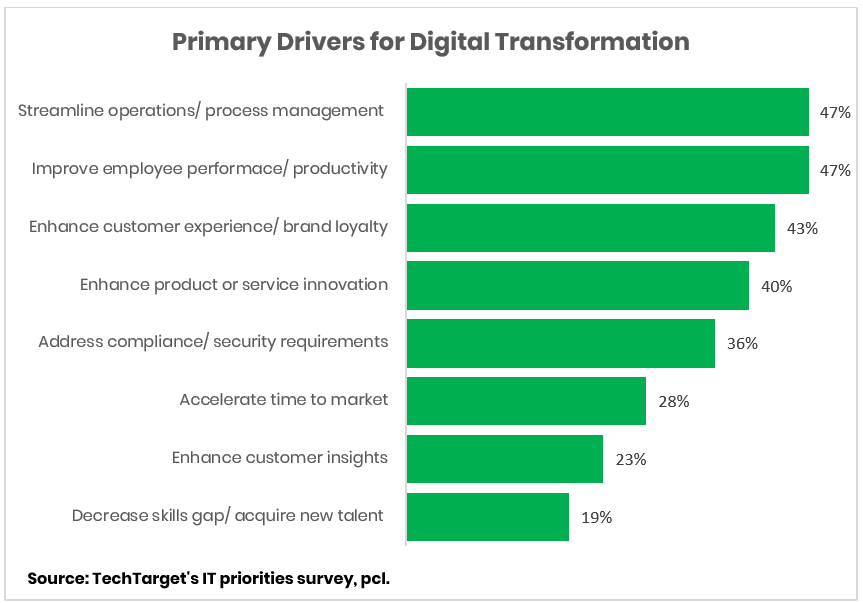Regardless of its size, every industry is becoming increasingly digital as the demand for digital products, services, and mediums grows. Organisations need to review everything they do, including internal processes and customer interactions.
In the IT industry, digital transformation is one of the most commonly used phrases with varying definitions. The term “digital transformation” refers to using technology to enhance existing processes and offer customers new and improved products and services. Digital transformation delivers a better experience for stakeholders such as customers, employees, partners, and suppliers with innovative technology. By implementing a digital transformation initiative, organisations rethink their day-to-day processes.
Everyone can agree that digital transformation involves some pretty significant changes to business culture beneath the hype and the fluff. A key element of digital transformation is the understanding of the potential benefit of the technologies. However, that does not mean digital transformation is all about technology; it also involves changing business processes and corporate culture. Too many people treat digital transformation as something around IT. In contrast, it is about the company culture, it’s about DNA, and it’s about business models. Organisations must approach digital transformation from the customer’s perspective.
We have to ask ourselves, “How can we adapt our business and processes to make the best use of our technology?”
As technology evolves, so should your business. Digital transformation isn’t a single project or change but an organisation-wide restructure that challenges mindsets, goals, and KPIs. At this point, enterprises aren’t deciding whether to transform; they are deciding how to change.
Why does digital transformation matter?
According to the Digital Transformation Index 2020 from Dell Technologies, a third of enterprise leaders are worried their organisations will not survive in the upcoming years, while 60% thought they’d stay but would shed many additional jobs and take years to return to profitability.
With the advent of new business models, more engaging customer experiences, and innovative products and services enabled by emerging technologies, market leaders will continue to be displaced and disrupted. Technology leaders are constantly reimagining, testing, developing, and adapting to make our organisations more efficient and productive.
According to the latest forecast by Gartner, Inc, globally, IT spending is projected to total $4.1 trillion in 2021, an increase of 8.4% from 2020. The ROI may vary depending on the transformation program and benefits. Digital transformation matters for many reasons, among them:
- Increases efficiency and productivity: Digital technologies improve efficiency and productivity by speeding up processes and streamlining processes. In banks, for instance, chatbots reduce the need for employees to answer multiple customer queries manually.
- Improves agility and innovation: By ditching their reliance on outdated and slow legacy technology systems, businesses become nimbler and more responsive to market trends.
- Enhances customer experience and engagement: Customers get better service by shifting to a customer-centric approach and paying attention to their preferences.
- Improves decision making: Today, organisations have access to a tremendous amount of data. The right analytical tools can transform these data into valuable insights that help make better-informed decisions more quickly. Companies can combine data from all customer interactions and formerly unstructured sources in a meaningful and actionable format to optimise customer experiences through digitalisation.
- Increases revenue: According to an SAP Center for Business Insight and Oxford Economics report, 80% of executives at companies with mature digital transformations say their efforts have led to increased sales and market share.
Speed Bumps on the Digital Transformation Journey.
Speed Bump 1 – Process Documentation
While the drive to transform transcends the size or sector of the organisation. Informal or non-existent documentation of processes (as is more common in smaller or less regulated Organisations/sectors) has constituted a significant hindrance to transformation. Seeing, Digital Transformation has been defined simply as “using technology to enhance existing processes”. Thus, enhancing an unarticulated process has proven to be a sore starting point (and often overlooked challenge) in the Digital Transformation Journey. Several organisations have been stymied at this crucial foundational stage and, without adequate guidance, have either spent undue resources on achieving digital transformation than was necessary or have spent unnecessarily much time and energy. It is imperative that process documentation be factored into the early phases of the digital transformation journey and accorded the due criticality required.
Speed Bump 2 – Constant Change
Evolution of the future of work Change is a constant in life and indeed synonymous with transformation. However, resistance to change is an inherent characteristic of humans, thus highlighting the “never-ending” battle humans face. This battle is exacerbated concerning technology as every knowledge or competency level achieved in technology or its application in business constitutes a “Plateau of comfort” from which any change is arduous. While the organisational goal of transformation is to be desired and beneficial to all stakeholders, various stakeholders’ changes will be responded to in diverse ways. Inadequate or ignored change management practices have often been the bane of many digital transformation endeavours. Readiness for change assessment and a persistent and continuous change management program is essential to birth the many benefits of digital transformation.
However, despite these speedbumps, organisations cannot afford to be complacent. The intersection of changing market forces, technological advancements, and growing consumer expectations around digital enablement led organisations to rethink their business processes. Here are some tips to keep in mind when preparing for digital transformation:
- You must clearly define your digital transformation vision.
- Get the right leaders on board.
- Ensure everyone in your organisation understands this vision.
- Choose the right technology that aligns with the digital transformation strategy.
- Develop methods to track and validate the digital transformation performance.
Let pcl. guide you on this journey of digital transformation. Contact us by sending an email to technology@phillipsconsulting.net
Written by:
 |
 |
| Oluwatomisin Nwanchi
Digital Strategist |
Oludiji Lana
Enterprise Solution Architect |

